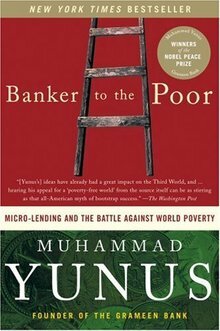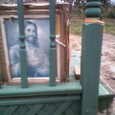Holistic Ministry and the Banker to the Poor
 I just got Banker to the Poor: Micro-Lending and the Battle Against World Poverty. It is the story of Muhammad Yunus and the Grameen Bank in Bangladesh. Yunus and Grameen Bank won the Nobel Peace Prize last year for their work in providing micro loans to the poorest of the poor and helping lift them out of poverty stricken conditions. Wikipedia had this basic explaination for what Yunus has been doing:
I just got Banker to the Poor: Micro-Lending and the Battle Against World Poverty. It is the story of Muhammad Yunus and the Grameen Bank in Bangladesh. Yunus and Grameen Bank won the Nobel Peace Prize last year for their work in providing micro loans to the poorest of the poor and helping lift them out of poverty stricken conditions. Wikipedia had this basic explaination for what Yunus has been doing:
In 1976, Yunus founded the Grameen Bank (Grameen means "of rural area", "of village") to make loans to poor Bangladeshis. The Grameen Bank has issued more than US$ 5.1 billion to 5.3 million borrowers. To ensure repayment, the bank uses a system of "solidarity groups". These small informal groups apply together for loans and its members act as co-guarantors of repayment and support one another's efforts at economic self-advancement[8]. As it has grown, the Grameen Bank has also developed other systems of alternate credit that serve the poor. In addition to microcredit, it offers education loans and housing loans as well as financing for fisheries and irrigation projects, venture capital, textiles, and other activities, along with other banking services such as savings.
The success of the Grameen model has inspired similar efforts throughout the developing world and even in industrialized nations, including the United States. The Grameen model of micro financing has been emulated in 23 countries. Many, but not all, microcredit projects also retain its emphasis on lending specifically to women. More than 96% of Grameen loans have gone to women, who suffer disproportionately from poverty and who are more likely than men to devote their earnings to their families[9].
While I am trying to find myself this weekend, I plan on reading a good portion of this book. From what I can tell, this man has done amazing work and he has made a major impact in reducing poverty by helping people help themselves. I am inspired. In a little over a week, I will be heading up an expedition to Northern India to develop relationships that will enable us to return and put on a public health conference with professionals from Alabama, as well as participate in microbanking possibilities with the head of an investment company that has set up their own non-profit to aid the poor of the world according the principles found in Isaiah 58. We are also exploring the set up of a non-profit called Community Development Initiatives (CDI) that will help us with this work, as well as many other things, both locally and globally. Our desire is to facilitate spiritual, social, and economic transformation from a Christian worldview by connecting Christian professionals and their resources with local/global need.
It seems to me that Yunus is doing part of the mission of the Church. We are to make disciples of nations and bring God's Kingdom on earth. We are to care for the poor, help people reflect the image of God, and truly help people connect relationally to God, one another, and their world. People like Yunus are revealing part of God's plan, if we would just pay attention. What if we began to appropriate the billions of dollars that American Christians give and spend on themselves to such initiatives? What if our incredible wealth began to flow in such a way as to help the poorest of the poor help themselves? Yunus says, "Poor people are not asking for charity; charity is not a solution for poverty." He is helping lift them out of poverty by giving them the means to develop their own businesses and provision and help themselves. What if the Church did the same? There are many examples of the Church doing just that, but not enough. I want to make more. And, if it is done from a gospel perspective, just like we have been doing on the Gulf Coast in the wake of Katrina, what could the limits be?
For several years, a group of us went to a local housing project every Sunday afternoon. We got know the people, did Bible studies and had prayer time. I became the unofficial chaplain to the Crips gang there and a personal confidante to the head of the gang over that area. God actually used me to lead him to the Lord. We met a guy one Sunday who had been in jail continuously from the age of 18 to 32. He had just gotten out after becoming a Christian in jail. We met with him every week, prayed with him, and helped him stay off drugs and out of jail. He's still out today, 3 years later, and is walking with the Lord. We saw many saved and many lives transformed.
Still, I was frustrated that we did not see more transformation. We gained trust. We spent hours in people's homes praying for them and getting to know them. The community embraced us. Yet, there were so many who were excited to see us and would respond when we were there, but when we left, they would immediately revert back to old ways. I would wonder why and spent a good deal of time praying about this. For every success story, there were 20 more who never made the jump. They would receive the Word, but it would get choked out almost immediately. One day in prayer, it occured to me that we were doing insufficient discipleship and evangelism. We were offering a purely spiritual message. For some, this was enough. For others who were completely dependent upon the government or menial jobs, it was just words. The gospel transforms not just the spiritual realm of life, but also the social and economic realms as well. If someone was on government assistance or had dropped out of high school and could only hope to flip burgers at Burger King, then they had most likely developed a dependency mindset. They weren't taking ownership over any area of their lives. Why would I think that they would take ownership over their spiritual growth?
I began to see that true evangelism and discipleship had to touch on every area of life. We didn't need to only be having Bible studies on sin and redemption, but we also needed to show people how to balance their checkbook and develop skills. We needed to help mothers raise their children and help fathers be responsible. We needed to help create better workers and students who could then influence their domains for the gospel. Salvation was not to just be an escape from hell, but it was also to be an introduction to a full new life in every facet. I couldn't believe what I had been missing.
Well, fast forward a couple of years. So much has happened, including the birth of another child (who later developed cancer and is doing great, by the way), the resignation of our previous pastor, a year of interim, and my promotion to pastor, and a thousand other issues. We are finally about to step back into things that we started learning about a couple of years ago. Hopefully, CDI will be the vehicle for that into our community as it provides a neutral interface with government, business, and other non-profits and churches. India will be a part of that as we seek to do this globally as well as locally. As we go, I hope to be learning from people like Yunus, who have been doing this type of thing from another motivation for quite some time. Maybe God is allowing non-Christians to be sign posts for us to remind us what our lives are supposed to be about. Maybe we should pay closer attention to what is happening around us.
Next Week: A review of a paper by Dr. Thom Wolf given at Lucknow University in India called "Progress Prone vs. Progress Resistant Cultures." His thesis is shocking, to say the least. Tune back in next week - hopefully, I will know my identity by then. :)








Alan: This is some terrific stuff. I am going to be praying as you spend the time working all this out. This is an idea I hope catches on. We need to start doing the work of the church again and this idea is wonderful.
Posted by: Debbie Kaufman | February 15, 2007 at 03:37 PM
I remember reading about Yunus in the news when he won the Nobel Peace Prize, and I was amazed at what he did. I couldn't help but wonder if we could do the same in America. My community has no industry, and most people who do work have to drive at least 30 miles each way to find jobs. I am not talking about living in the suburbs, but living in what amounts to slums and driving all that way to work for less than $10 an hour.
His quote, "Poor people are not asking for charity; charity is not a solution for poverty." really got me thinking. I have been struggling with the fact that most of what our church does - food boxes, helping with an occassional electricity bill or gas bill, and helping with Christmas - is charity, and it is like putting a band-aid on a broken leg. I think it is a necessary step for us to take in connecting with people and developing a heart for them, but it is not helping them.
Hopefully, we will be able to supply them with more knowledge about how to use money wisely, how to keep a house clean, etc. I hope your church is able to truly get back into its previous work, and to do more of what you see the people needing. I am excited to hear about what you are doing in India, just getting there is a tremendous task in itself. May the Lord bless your travels and your work there.
Posted by: David Cecil | February 16, 2007 at 10:21 AM
David,
Really interesting points. How can we do that here? What would it look like. A lot of work has been done in the realm of community development foundations and urban renewal and rural development. That is something that I am very interested in looking into and seeing how we can be a part of it. Let me know what you come up with.
Posted by: Alan Cross | February 16, 2007 at 11:19 AM
"It seems to me that Yunus is doing part of the mission of the Church. We are to make disciples of nations and bring God's Kingdom on earth. We are to care for the poor, help people reflect the image of God, and truly help people connect relationally to God, one another, and their world. People like Yunus are revealing part of God's plan, if we would just pay attention. What if we began to appropriate the billions of dollars that American Christians give and spend on themselves to such initiatives? What if our incredible wealth began to flow in such a way as to help the poorest of the poor help themselves?
Yunus says, "Poor people are not asking for charity; charity is not a solution for poverty." He is helping lift them out of poverty by giving them the means to develop their own businesses and provision and help themselves. What if the Church did the same? There are many examples of the Church doing just that, but not enough. I want to make more. And, if it is done from a gospel perspective, just like we have been doing on the Gulf Coast in the wake of Katrina, what could the limits be?"
You are right on. If you are successful you can also change the perception of Conservative Christianity - including mine. Your recognizing that we can and need to learn from people that have other religious beliefs then our own shows that you are a very special and wise person.
I have been tracking Yunus for sometime and am now spreading his message by portraying him in schools, clubs, churches in the Santa Barbara area.
Yunus just returned from India where he spent three days at the request of the Prime Minister. You are not the only one that recognizes how special Yunus is and how his microcredit Grameen Bank program is actually making a major difference in reducing poverty - starting in Bangledesh.
"Kolkata: Prime Minister Manmohan Singh has sought the advice of Nobel laureate Muhammad Yunus on legislation to oversee micro-credit programmes in India.
He [the Prime Minister] has sought my views on the [proposed] law which is to be finalised by NABARD [National Bank for Agriculture and Rural Development]," the Bangladeshi micro-credit pioneer and winner of the Nobel Peace Prize, 2006, who is now considering joining active politics, said here on Monday."
Posted by: Marty - Santa Barbara | February 16, 2007 at 03:59 PM
alan,
it was a joy to meet you in jackson at the conference. it was tremendous, wasnt it?
david
Posted by: volfan007 | February 16, 2007 at 09:34 PM
alan,
it was a joy to meet you in jackson at the conference. it was tremendous, wasnt it?
david
Posted by: volfan007 | February 16, 2007 at 09:34 PM
Funny how much this ties into Glocalization, which everybody is reviewing. Nation-building... hmm. To a certain extent, that makes me wonder a lot about these ideas I had a while back about the Broken Windows Theory and the Poverty Mindset. What would happen if we applied those things to New Orleans? Gosh... one day I might get to really write about it. When I have the time to seriously encounter it.
Posted by: Joe Kennedy | February 17, 2007 at 01:24 AM
Alan,
I applaud you for reading this. We need to be helping people find a long-term solution rather than just giving people money. We need to support, globally, people who are trying to better themselves and their communities by providing jobs and goods and services.
Joe, I read either Blink or Tipping Point (can't remember which book this was in), part of which talked about how NYC's crime went down, and it was the Broken Window Theory. I know there are critics to the theory, but I also think that it has merit. Having lived in New Orleans myself, I think there is something to that there. I'm coming down in April and will see first hand what's left, but before Katrina, it is something that should have been looked at. I'm sure it's that way still.
Posted by: David Phillips | February 18, 2007 at 04:40 AM
Great post Alan! You have touched on the humanitarian side of the Gospel message several times over the last few months that I have been reading you and this is the best post yet. At the risk of offering advice where it is not needed- or better put when I should be listening instead of speaking- here are a couple of things we have learned.
It takes more time to get there than you think. I have seen several people begin to serve well and then give up short of the goal. It has taken six years in one village to see the results we were certain would come in one. In another town some friends of mine do micro-enterprise and credit programs and have moved from $10,000 to just short of a million dollars in loans in five years. That sounds fast in a short sentence here but on the ground it was hard going for a long time.
Also, failure is a certainty. You will fall down in this process. Get up, learn and keep going.
Third, the spiritual results will be hard to measure and you must ask many times for direction and confirmation from the Lord to remain on track. I have seen many do good works on top of good works with no visible results. Some just need to keep walking in obedience and patience and others have left the right road and settled for less a long time ago.
Lastly, keep blogging about it and share with us what God is doing in you and through you. Walk in the authority he has given you and never give up. We are praying for you and your family.
Posted by: Strider | February 18, 2007 at 05:48 AM
Dear .Friend
Please pray to my work in Davao Comval Province that the Lord will supply our needs specially the Medicine for the ZTribal children
Thank you.God bless.
Pastor Robert &Noemi dumapias
Posted by: Robert Dumapias | March 01, 2007 at 12:28 AM